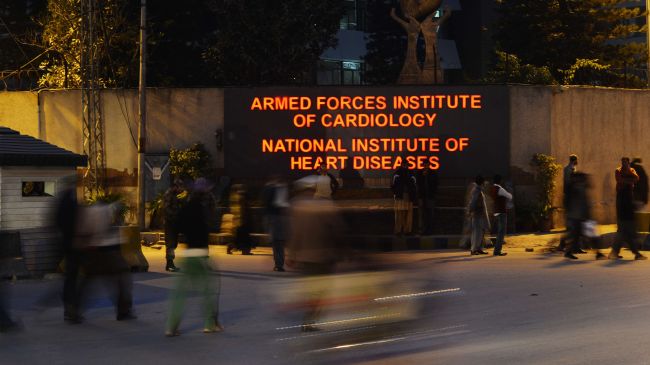Musharraf suffers heart problem on way to court

Former Pakistani President Pervez Musharraf has been taken to a military cardiac hospital after suffering chest pains on his way to court for his treason trial.
Musharraf had been summoned to appear before the special tribunal in Islamabad in a high treason case on Thursday — an offence that could send him to the gallows or force him to spend life in prison — after failing to appear for two previous sessions due to security scares.
Musharraf was on the way to the latest session when he fell ill with a “heart problem,” his lawyers said. He was transferred to the Armed Forces Institute of Cardiology in Rawalpindi and is undergoing tests.
The special tribunal, formed to try Musharraf for suspending the constitution in 2007, announced that it would grant him more time because of his reported medical issues. The court then ordered him to appear on January 6.
Asiya Ishaq, a leader of Musharraf’s All Pakistan Muslim League party, said he had been feeling pressure on his chest since Wednesday evening and was unwell.
She stated that “Musharraf has got three arteries blocked and is currently undergoing angiography,” an artery-scanning procedure.
There have been rumors in Pakistan that the 70-year-old retired army general will be allowed to leave the country without standing trial.
However, Musharraf has said that he will face all the criminal cases against him and will not flee from the country.
“I will face all cases… I will not run away,” Musharraf said in an interview broadcast on December 19 last year. “These are all fraud cases which lack any substantial evidence.”
This is the first time in Pakistan’s history that a former military ruler is facing the treason trial under Article 6 of the Pakistani constitution.
The government of Prime Minister Nawaz Sharif has charged him with abrogating, subverting, suspending and holding in abeyance the constitution by declaring a state of emergency and cracking down on the superior judiciary in November 2007.
Musharraf seized power in a bloodless coup in October 1999 by toppling the government of Sharif, who returned to power in June 2013 after winning a landmark parliamentary election held in May.
A three-judge bench of the special court, headed by Justice Faisal Arbab, convened its first meeting on December 13 to review the charge-sheet filed by the government and acceded to the request to try Musharraf.
In 2007, Musharraf sacked former Chief Justice Iftikhar Muhammad Chaudhry, declared a state of emergency in the country, suspended the constitution, and put judges under house arrest.
He also faces several other criminal charges, including one for the 2007 murder of former Prime Minister Benazir Bhutto.
Musharraf stepped down as president of the country in August 2008, about six months after his allies lost parliamentary elections in February 2008 and the new government threatened to impeach him. A year later, he left the country.
In March 2013, the former Pakistani president returned to the country after nearly four years of self-imposed exile in London and Dubai.







